Korean-American chef Corey Lee, the mastermind behind the three Michelin-starred restaurant Benu in San Francisco, has packed his debut book, “Benu,” to the brim.
“It’s ultimately a cookbook first, but also a book that was trying to communicate the inspiration behind the restaurant and meditation on the menu,” he said.
The book is stunning, a big, white hardcover with over 250 pages of recipes, essays, and breathtaking photography.
 |
Corey Lee, chef and patron of Benu. (Phaidon 2015, www.phaidon.com) |
Speaking to reporters at a press lunch at the restaurant Bicena in Seoul, Lee said that although he thought of Benu as ultimately an American restaurant, he dedicated significant portions of the book to Korea ― whether in essays or photographs of Korean scenery, porcelain, and people ― because of its impact on the identities of Lee as a chef, and of Benu.
“I slowly started to create an identity for the restaurant, and it was a personal journey for me,” he said. “Through that process, I came to understand what it means to be a Korean-American.”
Lee said that growing up in a Korean household exposed him to the different ways in which Koreans approach food.
“Korean food was the most direct link to my native culture, being in the U.S.,” he said. “Not only the actual food but the importance of the dining rules, the importance of food in the Korean family, the way the meal is structured, and what the food signifies.”
Those Korean influences can be spotted through Lee’s descriptions and introductions to his recipes, which are presented in the book as a 32-course tasting menu.
Having said that, there is a distinct non-Korean characteristic worth noting about “Benu” ― readers would be hard-pressed to recreate the recipes inside. The techniques required are difficult and delicate, often with eclectic ingredients. They are not for cooking at home. According to Lee, that is partly due to the difference in the ways Koreans and Westerners approach dining out.
“In the U.S. and other places in Western Europe, there’s a culture of fine dining and cooking that you don’t have at home. In Korea, I find that many of the food experiences you have in restaurants are appropriate for home, and even made at home. So dining out is not just about the food that’s served,” he said.
The structure of the book, mingling recipes with personal insights, also helps to show that the varied elements reflected in Lee’s cooking arises out of an innate inspiration, rather than a carefully calculated plan to fuse different cuisines together.
“I think we’re in this strange age where chefs suddenly have a philosophy after a year or so,” he said after a careful pause when asked about his own. “Ultimately I think there is perhaps something that we try to achieve in cooking that is cerebral. But that’s not where it started. In a craft, when you start out, it happens in stages. You have to acquire skills, to make something well, it’s something you do with your hands, and after you become proficient at that, you have a set of tools to express what you want to say.”
In the end, “Benu” is not about sending a message, or even necessarily to introduce the menu at Benu. It is a description of Lee’s world, and why he chooses to pour his all into that path.
“The reason I continue to enjoy being a chef is because the restaurant that I work in, the environment, is very small. In that little world I’ve created, everything that we commit ourselves to makes sense for me. It’s very comforting,” he said.
By Won Ho-jung
hjwon@heraldcorp.com)







![[Today’s K-pop] Blackpink’s Jennie, Lisa invited to Coachella as solo acts](http://res.heraldm.com/phpwas/restmb_idxmake.php?idx=644&simg=/content/image/2024/11/21/20241121050099_0.jpg)
